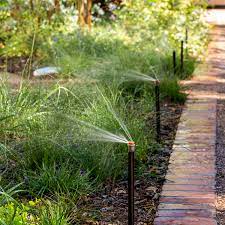There are three main types of irrigation systems that can be used in your garden. These are trickle/drip, sprinkler and surface irrigation.
Drip Line Irrigation is one of the most environmentally friendly types of irrigation available. It can be as simple as using overhead piping with tiny holes to drip water at a slow rate, or more advanced systems that use special components to control the exact flow of the water.
This type of garden irrigation can be used in almost any garden and requires much less maintenance than other options. It also allows for easy watering of smaller areas, such as flower beds and vegetable gardens.
Centre Pivot Irrigation is another low-maintenance option that can be used in a wide variety of locations. This type of system uses a central pipe with outlets that rotate around a central pivot point.
It can be used for any part of the garden, and can even be moved and reconstructed to ensure that your garden stays well watered.
Garden irrigation systems Melbourne are an essential part of any garden regardless of size or type. If you have a small backyard or a large, colourful garden that needs watering on a regular basis, it’s important to find the right type of system for your area.
Overhead Landscape Irrigation is a popular choice for many gardeners as it does not require trenches and can be installed overhead. It’s also more affordable than other systems and is easy to move around.
The stonework Melbourne industry has evolved significantly in recent times, with modern technology making many aspects of the job easier. This has included cranes, forklifts and motor powered mortar mixers, which save both time and energy on a project.
Sealing Stonework
The best way to maintain the longevity of your masonry is to protect it from wear and tear, spills and bacteria by sealing it regularly. This can be done through either a penetrating or topical sealer.
Depending on the type of stone used, it may need to be sealed as frequently as once every six months. This is necessary to prevent the growth of rust, bacteria and discoloration, and it helps maintain the original appearance of the stone.
It also reduces the risk of slip-related accidents and stains. As the stone is absorbed by the sealer, it becomes chemically bonded to the surface and prevents liquids from permeating the stone’s pores.
There are several different types of stone that can be used for masonry, all of which have their own unique properties. Some are better suited to particular purposes than others, such as limestone and sandstone which are commonly used for wall cladding, paving and flooring.
Natural stonework is the art of creating buildings, structures, masons and sculptures using natural or man-made stones as the primary material. It is one of the oldest professions in the world and has long been essential in building shelters, temples, monuments, statues, fortifications, roads, bridges and entire cities.

